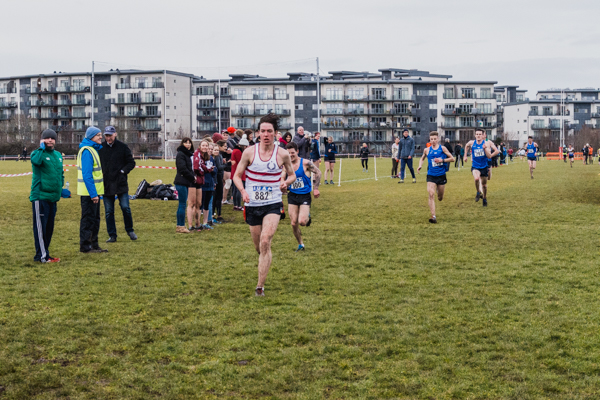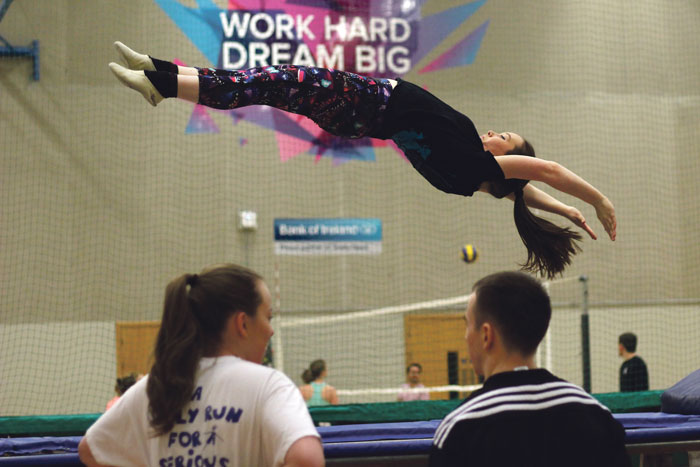When the news broke last week that freshers’ week as we know it will likely not happen for Trinity’s sports clubs, it became even more obvious that the road ahead would not be a straightforward one for those in College returning to sport.
While the government’s five-phase roadmap provides some clarity when it comes to the question of how sport can resume on campus and beyond, the extent to which the virus will affect Trinity’s sporting scene is still unclear.
For many clubs, freshers’ week is important for a multitude of reasons. This is when the vast majority of members sign up to join their chosen sports club. In extension, this week at the beginning of the academic year is a vital revenue-generator for clubs. While a virtual alternative seems to be a viable alternative, its effectiveness remains to be seen.
Cathal Hannafin, outgoing secretary at Dublin University Trampoline Club (DUTC), says that his club recruit at least “80 per cent” of their members during freshers’ week in any given year. The impact of a changed sign-up format is an issue that the club have thought about.
From people who are looking to try something new, I think that’s going to hit us hard, in terms of getting beginners, people who want to pick up the sport
“It has been in the back of our minds, like how are we going to deal with that”, he says. “I suppose we’re not so awfully hit because we can run a few demo sessions – like small scale – where we can have few enough people so they can see what we do.”
“It definitely will be a big hit I will say…. the virtual stuff is not quite the same.”
Eimear O’Connor, outgoing club captain at Trinity Volleyball Club, echoes Hannafin’s concerns: “I think from people who are looking to try something new, I think that’s going to hit us hard, in terms of getting beginners, people who want to pick up the sport.”
“I think for experienced players who are coming over, if you’ve played volleyball before, you would look to try and join the club… whereas if its people wandering through freshers’ fair, you will lose that footfall as well, so I’d say that will impact us a lot as well.”
O’Connor also posits that her club relies heavily on visiting students when building a new team at the beginning of the year. With a drop off in international students enrolling at Trinity next year inevitable, the club will be forced to source talent elsewhere.

DUHAC’s incoming captain says an online freshers’ week is “not ideal”, but adds that “it’s probably the best option that we have for sign-ups at the minute”.
“We rely a lot on exchange students, and if there’s less of them, we’re not going to have as many players unless we have a lot of Irish players coming in from different schools that would have played volleyball”, she says.
Caron Ryan, incoming women’s harriers captain at Dublin University Harriers and Athletics Club, believes that an online freshers’ week is “not ideal”, but given the situation we find ourselves in, “it’s probably the best option that we have for sign-ups at the minute”.
“It would be a worry because we do get a lot of money from sign ups, but hopefully, people will still be enthusiastic about freshers’ week through an online platform.”
“That’s just all we can hope for”, she adds.
It would be a worry because we do get a lot of money from sign ups, but hopefully, people will still be enthusiastic about freshers’ week
The majority of Dublin University Fencing Club’s (DUFC) current members had never tried fencing before joining the club when they moved to university. Angie Parisi, incoming club captain at DUFC, says the club will focus on social media in an effort to maintain recruitment levels at the beginning of the academic year.
“It’s definitely going to be a challenge, because we rely on physically being able to give the pitch and the spiel about our sport, at freshers’, like most clubs.”
“One of the things that we’re working on is to keep our social media presence active, so that when prospective students come to Trinity and they see all the sports, they’re going to have recent contact from the fencing club – get an idea of what we do”, she says.

Dublin University Trampoline Club recruit at least 80 per cent of their members during freshers’ week in any given year.
“We rely on [freshers’] quite a bit. But, obviously, now we’re going to adapt and adjust our recruiting so that we can retain our numbers, either through social media, any virtual measures that Trinity offers, and we’ll go from there.”
Maintaining numbers is critical for clubs – less members equates to less income. The importance of a strong freshers’ week is accentuated this year by the fact that Trinity Sport and Dublin University Central Athletic Club (DUCAC) may suffer significant financial consequences as a result of the coronavirus.
In an email statement to The University Times two weeks ago, DUCAC chairperson Jemil Saidi that he was unable to comment on how the virus will affect College’s budgetary allocation to DUCAC “until the capitation committee meets at the beginning of the new academic year”.
Although DUCAC told club captains last week to prepare budget proposals as normal, there is a worry that allocations will be affected.
“I know DUCAC will do the best they can to keep the clubs going, but obviously if they’re working with a restricted budget themselves, there’s nothing they can do about that for us”, O’Connor says.
It’s definitely going to be a challenge, because we rely on physically being able to give the pitch and the spiel about our sport, at freshers’
“Tournament entries mightn’t be as much as usual, so that might mitigate costs a little but, but I’d say yeah: funding will drop a good bit, and obviously with the freshers that kind of limits our income too.”
DUTC’s Hannafin believes that allocations aren’t of huge concern for his club, given that much of their spending is “essential”: “We wouldn’t be buying new trampolines every week.”
However, he says the overall drop in finances for sport in College could be a problem.
“It kind of becomes worse with freshers’ week as well”, he says, “because if we get fewer sign ups, we get fewer finances ourselves. And then that ties into DUCAC and the sports centre losing their own money. It could be a negative combo”.
For now, most clubs are focusing on their eventual return to sport and electing new committees. As they edge closer to a resumption of play, implications will become more clear, and a need for answers and adaptations more urgent.







